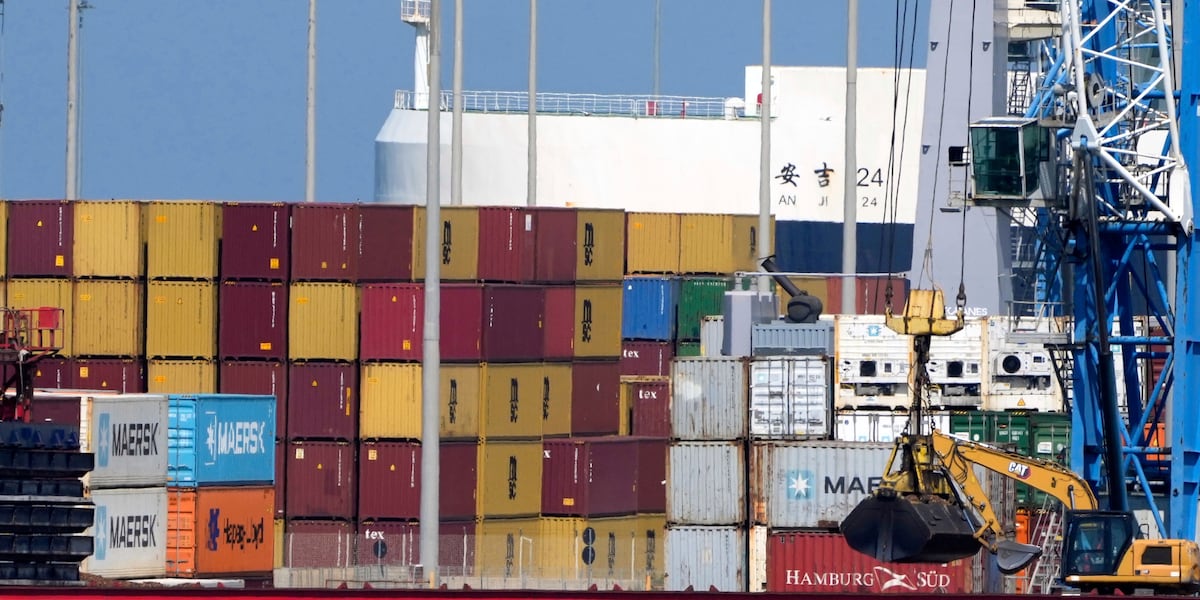A recent economic analysis from Creighton University reveals growing concerns among supply chain professionals over rising import costs driven by tariffs. The Mid-America Business Conditions Index indicates that only 10 percent of surveyed supply managers anticipate improved economic conditions in the next half-year, suggesting widespread pessimism about near-term prospects amid ongoing trade policy impacts.
Dr. Ernie Goss, Professor of Economics at Creighton, explained that while consumer prices have not yet significantly reflected these changes, wholesale-level costs are climbing. He pointed to the producer price index, which recorded a notable increase the previous month, signaling pressure building within manufacturing and distribution networks. This trend is particularly challenging for small and mid-sized enterprises, which lack the financial buffers of larger corporations like Walmart or Microsoft.
Industries relying on raw materials such as plastics, metals, corn, and soybeans are already experiencing disruptions. Goss cited Conagra, a major food processor in Nebraska, as an example of a firm transforming agricultural inputs into consumer products now facing tighter margins. With limited ability to pass costs onto buyers, many businesses are absorbing the added expenses for now.
Trade restrictions affecting Canada, China, and Mexico have complicated procurement strategies. While conditions have eased somewhat with Canada and Mexico, tensions with China continue to pose challenges. Additionally, lower inventory levels compared to the previous year may result in reduced product availability during peak shopping periods like Halloween and the winter holidays.
To mitigate rising costs, some companies are shifting sourcing to countries less affected by tariffs, including Vietnam. However, Goss noted that a portion of goods labeled as Vietnamese originate in China and are rerouted to avoid duties—a practice the U.S. administration has attempted to curb through penalties. Efforts to bring production back to the U.S., known as reshoring, have so far yielded limited results, though experts acknowledge such transitions require time.
Looking ahead, certain imported goods—such as clothing, footwear, cigars, and select food items—may become both more expensive and harder to find. Goss emphasized that in markets with little competition, consumers are more likely to bear the cost increases, whereas competitive sectors may see prices held in check.
For now, the broader consumer base has been shielded from tariff effects due to companies absorbing higher input prices, but this strategy may not be sustainable long-term.
— news from WOWT
— News Original —
Creighton economic report shows supply managers concerned tariffs are increasing import costs
OMAHA, Neb. (WOWT) – A new economic report from Creighton University shows suppliers are becoming more worried about tariffs. n nAccording to the Creighton Mid-America Business Conditions Index, one in 10 supply managers surveyed expect economic conditions to improve over the next 6 months. Meaning 90% of those managers are prepared for the economy to get worse as they navigate tariff impacts on supply. n nCreighton Professor of Economics Dr. Ernie Goss tells First Alert 6, Midwest supply managers expressed concern tariffs were pushing import prices higher. Tariffs against countries like China have impacted buying power on some of these supplies. n n“It has not shown up at the consumer level but it has definitely show up at the wholesale level,” said Dr. Goss. “The producer price index, which is essentially a wholesale price index, that was a significant bump up last month.” Dr. Goss says the increase has put a squeeze on profit margins. Particularly an issue for smaller and midsize manufacturing businesses. n n“They have been squeezed, thus far the profits have been squeezed,” said Dr. Goss. “It is easier for a Microsoft or a Walmart to have their margins squeezed than a small shoe business,” said Goss. n nDr. Goss says companies that purchase inputs like plastic, metal, corn, soybean, etc. are seeing impacts to their supply chain. “Like here in Nebraska you have got a prominent firm, Conagra, they are turning raw materials into Lean Cuisines, meat, potatoes, and all sorts of things that we all eat, they are coming from Conagra,” said Dr. Goss. n nSupply managers are navigating changing tariff prices impacting countries like Canada, China and Mexico. “Luckily some of those are easing, that would be Mexico and Canada are looking somewhat better but China remains an issue, said Dr. Goss. n nAnother issue is availability. “All of these businesses they bought inventory and now they worked off those inventories,” said Dr. Goss. “Inventories are lower then they were this time last year so individuals out there when they go out shopping for Halloween, or for Christmas, the buying season they will not find as many choices.” n nNow as supply managers are restocking their inventories, some are trying to find ways around the higher import costs. One of those ways: purchasing items through less impacted countries like Vietnam. n n“We are seeing more and more goods through there, now unfortunately some of those goods are Chinese goods transshipped from China to Vietnam to us,” said Dr. Goss. “Now the President has tried to get a handle on that by putting penalties on that type of environment but the idea of reshoring that was part of the goal, well there has not been a lot of reshoring just yet, now of course it takes time.” n nDr. Goss tells First Alert 6 he does expect products like cigars, shoes, clothing, some food and other imports could get more expensive and potentially become less available as we get closer to the holiday buying season. n n“When there is not competition like in shoes, that maybe absorbed by the consumer,” explained Dr. Goss. “In those cases where there is adequate competition, you will get the opposite.” n nDr. Ernie Goss says so far, the reason consumers have not felt the effect of tariffs yet is because companies are absorbing that cost, for now.
